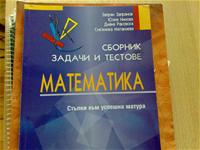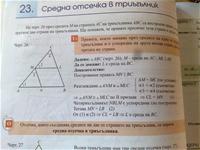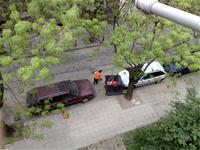It's the education, stupid!
Adelina Marini, May 28, 2010
 What can be worse than a heavy financial and economic crisis? The long-term one. And what can be the reasons for it? No matter how tempted you might feel to enumerate a lot of reasons, it is actually only one - bad education. The intoxicating incompetence, and sometimes illiteracy at the highest management levels in the entire public administration, institutes, companies, universities and schools is the primary reason for the crisis which is yet to get worse. How can we rely on someone to build a road if engineers are incompetent and lack the slightest idea of the latest technologies for road construction, of the composition of the asphalt, of temperature variations, humidity, local climate?
What can be worse than a heavy financial and economic crisis? The long-term one. And what can be the reasons for it? No matter how tempted you might feel to enumerate a lot of reasons, it is actually only one - bad education. The intoxicating incompetence, and sometimes illiteracy at the highest management levels in the entire public administration, institutes, companies, universities and schools is the primary reason for the crisis which is yet to get worse. How can we rely on someone to build a road if engineers are incompetent and lack the slightest idea of the latest technologies for road construction, of the composition of the asphalt, of temperature variations, humidity, local climate?
Or, how can we rely on optimizing and facilitating our work in the company with a new software product if we hire a computer company, where students work, trying to apply what they had learned at university and in the end we get a product that even they cannot use? How can we defend our national interests if we are offered a minister of foreign affairs who does not know where Somalia is, for example?
Or, how can we be sure that our interests are being protected if there are  Members of Parliament who are at an age, implying they should still be in university or at least making their first steps at work? How can these people know how to read legislation and what legislation actually is?
Members of Parliament who are at an age, implying they should still be in university or at least making their first steps at work? How can these people know how to read legislation and what legislation actually is?
I would probably omit many more important things but in fact the idea is only one - without reasonable education, producing people who can and love thinking, analyze, discuss, search for arguments, proof, who strive for the new and unknown, our country will fall deeper and deeper into crisis, the dimension of which we cannot even imagine. Or, to put it simpler, unless we boost competitiveness we are lost.
Of course education needs money. But before that it needs national consent - what do we have to teach our children (future taxpayers). Then a difficult and hard reform has to be realised which might leave a lot of people jobless but will guarantee that in a distant future we might have progress.
 Our education is trying to strike a balance between Renaissance traditions and pseudo social stability in a market oriented environment with a high-tech deviation. This mixture is quite explosive in itself. I don't want to comment on what kind of books our children should study at school because this is just a detail. What is more important for those who will write the future textbooks is to know that literature is most of all a discussion. This is a written way of discussing a problem. From this point of view the subject literature at school should make children talk, discuss, argue, search for arguments in the books to defend their theses. They should be left to disagree or adore and not be punished for not understanding the Bulgarian Renaissance writer Ivan Vazov but find something in Antoine de Saint-Exupéry and without being forced to study by heart or recognize quotes. Or to put it differently - they should be forced to consider and think.
Our education is trying to strike a balance between Renaissance traditions and pseudo social stability in a market oriented environment with a high-tech deviation. This mixture is quite explosive in itself. I don't want to comment on what kind of books our children should study at school because this is just a detail. What is more important for those who will write the future textbooks is to know that literature is most of all a discussion. This is a written way of discussing a problem. From this point of view the subject literature at school should make children talk, discuss, argue, search for arguments in the books to defend their theses. They should be left to disagree or adore and not be punished for not understanding the Bulgarian Renaissance writer Ivan Vazov but find something in Antoine de Saint-Exupéry and without being forced to study by heart or recognize quotes. Or to put it differently - they should be forced to consider and think.
Literature by itself is not capable of miracles. It can only make children more  open to the world, striving for the books and defending their personal opinion and position.
open to the world, striving for the books and defending their personal opinion and position.
Another school subject is math which currently is capable of making every child hate school. Math should make pupils think logically and make them look for different solutions to a single problem. This means that more attention should be paid to solutions rather than pouring theory into children's heads. And most of all the vicious practice of studying schemes should be avoided. Math is not a paper template which a child should put over the problem and see whether it would fit.
Same goes logic for what children should study in the chemistry, biology and physics classes. These subjects must reveal the world to them and not make it difficult to understand. Instead of learning by heart stupid lessons and explanations, children need to go out, research, make important mixtures and see what cause and effect is.
Ultimately, if we think about it all those great scientists who have achieved so much in trying to explain the world to us did not study in prestigious universities. They simply contemplated the world around them and thus reached the conclusion that the Earth goes round the Sun, for example.
 Such contemplation should be motivated in our kids instead of making them solve piles of stupid and unnecessary tests.
Such contemplation should be motivated in our kids instead of making them solve piles of stupid and unnecessary tests.
The biggest problem of all the above is who? Where can we find teachers who instead of making pupils learn by heart their lessons and not have an opinion of their own, to stimulate them, not to despise the different, not to punish them for finding a different angle?
I have no answer to this question. But as I mentioned above such a profound reform of the philosophy of the educational system should happen after a national consensus. And such a reform should start from the the first degree at school, pass through colleges and high school and end in the universities.
I start trembling with the memory of the way we go to lectures in our universities. Why should I waste any time to sit in a vaguely heated hall and listen to a weary with life professor to read his lectures from pieces of paper, almost yellow with time or to draw things on the blackboard with a chalk, spreading waves of chalk powder all around? Isn't it better if we agree on a list of books to read and then discuss them during lectures?
It is a fact that education is a conservative area which needs time to change. But not a lesser fact is that the world around us is changing with dynamics which we hardly knew some 20 years ago. But it is not the dynamics that is the problem. The drama is in society's refusal to comprehend it. Because while we appoint traffic policemen to sit in the bushes to prowl for offenders, people in the developed world get notifications in their mailboxes that they had already been fined for violations of the traffic rules.
 And while we create employment through manual cleaning of the streets, people in the developed world use machines. And while we wait in long queues to pay our taxes, people do that only with couple of strikes on the computer keyboard. And this is what exactly the term competitiveness means - to find a solution which is cheapest, useful and can be implemented immediately.
And while we create employment through manual cleaning of the streets, people in the developed world use machines. And while we wait in long queues to pay our taxes, people do that only with couple of strikes on the computer keyboard. And this is what exactly the term competitiveness means - to find a solution which is cheapest, useful and can be implemented immediately.
 Krasimir Valchev | © Council of the EU
Krasimir Valchev | © Council of the EU | © euinside
| © euinside | © EU
| © EU